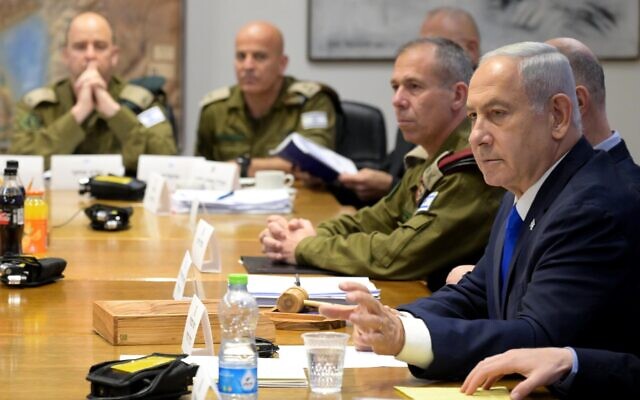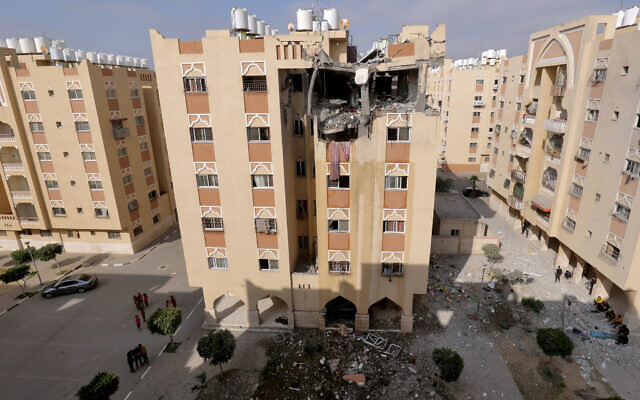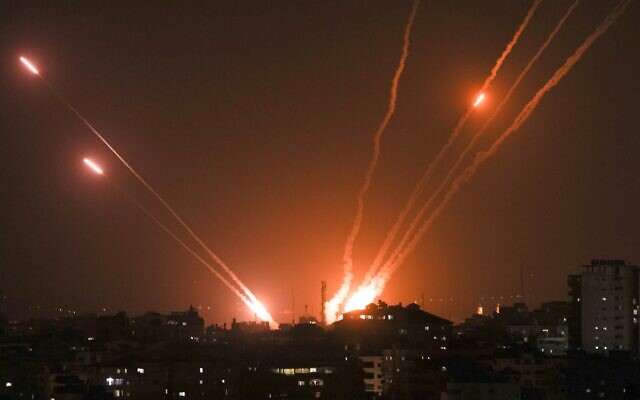The five-day battle between Israel and the Palestinian Islamic Jihad terror group in the Gaza Strip dubbed Operation Shield and Arrow, which ended with a ceasefire Saturday night, was the first major conflict overseen by military chief Lt. Gen. Herzi Halevi. The round of fighting was considered successful, but dragged on longer than needed, with the next potential escalation just around the corner.
On a strictly military basis, Israel emerged as the clear victor. Six senior Islamic Jihad commanders were killed — three in the opening strikes early Tuesday morning — and hundreds of sites belonging to the terror group were struck. The Israel Defense Forces said the rate of mortar fire on southern border communities decreased by 50 percent in comparison to previous rounds against Islamic Jihad, thanks to strikes against launch squads.
Israeli officials said the military achieved all of its goals — not during the fighting, but in the initial strikes in Gaza just after 2 a.m. on Tuesday. Still, three more senior commanders in the terror group were killed in the following days, after major rocket attacks on southern and central Israel. Officials, including Halevi, had threatened Islamic Jihad that the targeted killings would continue should the rocket fire not cease.
The cycle of limited battles in recent years against Islamic Jihad, the second-largest terror group in the Gaza Strip, is sounding like a broken record: Time and again Israel has killed senior members of the group after attacks on the country, leading to rocket fire for several days, until a truce is mediated by Egypt.
The first time Israel fought against Islamic Jihad alone, without Gaza’s ruling Hamas terror group joining, was in 2019, following the assassination of a senior commander: Baha Abu al-Ata was the Islamic Jihad chief in northern Gaza, responsible for a series of rocket attacks against Israel that year.
In August 2022, Israel fought a similar battle against Islamic Jihad, after again launching a surprise attack against the group and killing Tayseer Jabari, also the commander of the terror group in northern Gaza. (Jabari had replaced Hussam Abu Harbeed, who was killed by Israel during a war in May 2021 against Hamas and other groups. Abu Harbeed had, in turn, replaced Abu al-Ata.)
The operation last year came after threats by Islamic Jihad to respond to the arrest of a senior member of the group in the West Bank, Bassem Saadi.
This year’s battle started under similar circumstances: A member of Islamic Jihad in the West Bank, Khader Adnan, long accused of being a spokesperson for the group, died in Israeli custody while awaiting trial, after an 86-day hunger strike. Not long after Adnan’s death on May 2, Islamic Jihad launched over 100 rockets at Israel. After a single day of fighting, the sides agreed to a ceasefire mediated by officials from Egypt, Qatar, and the United Nations.
But Israel had other plans.
The initial strikes
The same day the ceasefire took effect, Prime Minister Benjamin Netanyahu met with senior military and defense officials to approve Operation Shield and Arrow.

In this handout photo, Prime Minister Benjamin Netanyahu attends a security cabinet meeting at military headquarters in Tel Aviv on May 9, 2023. (Avi Ohayan/GPO)
The military and Shin Bet security agency waited several days for the optimal time to assassinate Khalil Bahtini, Jabari’s successor as Islamic Jihad’s northern Gaza chief; Jihad Ghannam, a top official in the group’s military council; and Tareq Izz ed-Din, who was accused of directing Islamic Jihad terror activities in the West Bank from a base in Gaza.
The separate strikes on the three at their residences took place within 20 seconds early Tuesday morning. The IDF was satisfied with the results of the operation, despite it causing the deaths of 10 civilians, including the wives and children of the terror leaders, and several of their neighbors.
The military anticipated rocket fire or attacks on the border immediately after carrying out the attack, closing off several roads exposed to anti-tank guided missiles, and issuing restrictions on gathering and movement up to 40 kilometers from the Gaza Strip.

Israeli soldiers block a road near the border with Gaza, southern Israel, on May 10, 2023 (Photo by Flash90)
And on Tuesday afternoon, the IDF targeted two Islamic Jihad members who were en route to carry out an anti-tank missile attack on the border against Israeli targets — apparently thwarting the terror group’s bid for a dramatic opening to its reprisal attacks.
The tense silence in Israel reigned until Wednesday morning, around 36 hours after the initial strikes in Gaza, when Islamic Jihad launched volleys of rockets at southern Israel and a handful of long-range projectiles at Tel Aviv.
Toward Wednesday evening, reports of a potential ceasefire began to circulate for the first time. Israel confirmed it was evaluating a proposal offered by Egyptian mediators, but things quickly fell apart after a renewed bombardment of Israeli cities, causing extensive damage, that night.
Ceasefire delayed
Truce talks were set back again after Israel carried out reprisal strikes in the Gaza Strip, including separate attacks on Thursday that killed Ali Ghali, the head of the Islamic Jihad rocket forces, and Ahmad Abu Deka, his deputy. Terrorists launched a volley of rockets toward central and southern Israel in response, continuing the cycle.
In one of the attacks on Thursday, a rocket slammed into a residential building in the central city of Rehovot, killing 80-year-old Inga Avramyan.
On Friday afternoon, the military struck and killed a sixth senior Islamic Jihad member. Iyad al-Hassani was in charge of the group’s operations department. He had also just replaced the head of Islamic Jihad in northern Gaza, Bahtini, killed in the initial strikes. Al-Hassani was thus the fifth commander of Islamic Jihad in northern Gaza to be killed by Israel in less than four years.

Police and rescue forces near a building that was hit by a rocket fired from the Gaza Strip, in Rehovot, May 11, 2023. (Yossi Aloni/Flash90)
Rocket and mortar fire continued over the weekend, albeit sporadically, with some defense officials estimating Islamic Jihad was seeking to drag the conflict out for as long as possible. A new ceasefire offer was being examined by the sides on Saturday when rocket fire killed a Palestinian man from the Gaza Strip who was working in Israel, and seriously wounded his brother.
Ultimately, later than initially expected, Saturday night saw a truce brokered — by Egypt, like in every recent round of fighting. And true to tradition, rocket fire continued even after the 10 p.m. ceasefire, leading to renewed Israeli strikes, and eventually, Islamic Jihad getting the last word.
Facts and figures
The IDF said that, in total, over the five days, more than 1,400 rockets and mortars were launched from the Gaza Strip at Israel. The Iron Dome air defense system intercepted some 430 projectiles that were headed toward populated areas, at a 95 percent success rate. The medium-range David’s Sling system also intercepted two projectiles during the fighting, in its first-ever successful operational use.
While Islamic Jihad is believed to have thousands of projectiles, the vast majority of them are thought to be low-quality short-range rockets or mortars, according to military assessments. The terror group has some long-range rockets, but not close to the capacity of Hamas, which managed to attack central Israel repeatedly during a war in May 2021. At the same time, upgrades to the Iron Dome’s Tamir missiles have raised the successful interception rate.
However, there were several rockets that managed to evade the system and land in populated areas, killing Inga Avramyan in her home in Rehovot, and causing some damage to homes and civilian infrastructure. The second death occurred in an open area, where the Iron Dome does not attempt to intercept incoming projectiles.
Also according to the IDF’s data, some 290 rockets launched toward Israel fell short in the Gaza Strip. In several cases, failed rocket launches killed Palestinian civilians. According to military estimates, at least four uninvolved Palestinians were killed in such incidents, some of them children.
In all, the IDF said it struck over 420 Islamic Jihad targets across the Strip, including command centers used by the terror group and dozens of rocket launching sites.

This image released by Islamic Jihad shows senior commanders killed during a five-day battle with Israel between May 9 and 13, from left to right: Ahmed Abu Deka, Iyad al-Hassani, Jihad Ghannam, Khalil Bahtini, Tareq Izz ed-Din, and Ali Ghali. (Courtesy)
Israeli officials said the targeted killings of senior Islamic Jihad members crippled its chain of command, an achievement in the round of fighting. But it did not prevent the continuation of rocket attacks until just after the ceasefire, with the terror group being given orders by its leadership abroad, mostly in Lebanon, military officials said.
The IDF says it managed better this round in actively preventing rocket fire on Israel or anti-tank missile attacks on the border, striking ten squads that were en route to launch an attack or had just fired rockets. Military officials said the efforts resulted in a 50% reduction in mortar fire on the south compared to the last round with Islamic Jihad, and no successful anti-tank missile attacks.

Rockets are launched from the southern Gaza Strip towards Israel on May 12, 2023 (SAID KHATIB / AFP)
The Hamas-run health ministry in the Gaza Strip said 33 people were killed amid the fighting, including six children, but it did not say how many of the total killed were affiliated with terror groups. At least 18 of the dead were claimed as members by Islamic Jihad, the Popular Front for the Liberation of Palestine, and the Mujahideen Brigades, another, smaller, terror group.
Israel generally rejects criticism that it targets civilians, saying it takes numerous precautions to prevent such unnecessary casualties. Still, it did admit to the deaths of 10 civilians in the initial strikes against the Islamic Jihad leaders.
It says its target selection is based on sophisticated intelligence and is cleared by legal advisers and other experts. The military also says it has fine-tuned its guided missiles, delivering small payloads that minimize damage beyond the precise target.
Israel also argues that civilian casualties are inevitable in Gaza’s densely populated urban environment. Terrorists often fire rockets from crowded residential areas, drawing Israeli retaliatory strikes, and Israel accuses the terrorists of using civilians, including their own families, as human shields.

A picture shows a building housing the apartment (top floor) of an Islamic Jihad military leader, which was destroyed by an Israeli air strike in Khan Yunis, early on May 11, 2023. (SAID KHATIB / AFP)
Israel has fought four major wars and several shorter rounds of fighting against terror groups in the Gaza Strip. Some rounds, including the latest, were limited only to the Iran-backed Islamic Jihad, with Gaza’s Hamas rulers remaining on the sidelines.
The ceasefire began Saturday at 10 p.m., and despite several rocket launches in the following hour, Israel lifted all restrictions on the home front Sunday by noon, opening roads, train lines, and border crossings closed for five days.
The next round
So quiet will now reign — until the next inevitable round of fighting, which may come sooner than later, once Islamic Jihad replaces its slain leaders, restocks its rockets, and prepares for battle.
Israeli military officials have cautioned that the controversial rally of Jewish nationalists through the Muslim Quarter of Jerusalem’s Old City on Thursday, to mark Jerusalem Day, is the next potential spark to set off a new round of fighting.
There have not been any changes to the schedule, indicating Israel’s defense establishment believes the day will pass without any serious incident. But with tensions already high following the latest round of hostilities, Israel is counting down to the next conflict with the Gaza Strip, be it on Thursday or a later date.
"conflict" - Google News
May 14, 2023 at 08:48PM
https://ift.tt/bB50esz
Operation Broken Record: Israel is already counting down to the next Gaza conflict - The Times of Israel
"conflict" - Google News
https://ift.tt/ewTAJQX
https://ift.tt/l2TwVak
Bagikan Berita Ini
















0 Response to "Operation Broken Record: Israel is already counting down to the next Gaza conflict - The Times of Israel"
Post a Comment